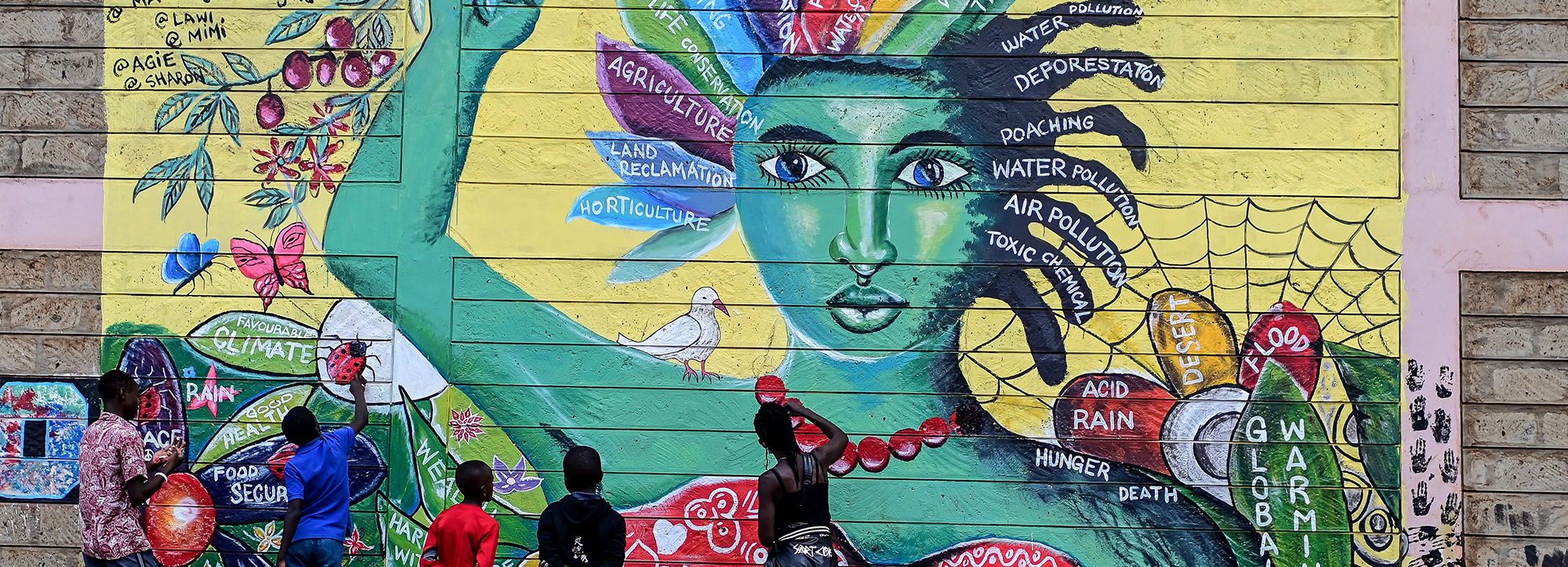The connections between climate and our health
Artists participate in a local art project, Art 360, to create a mural raising awareness of health and global climate changes in Nairobi, Kenya.

These briefings look at the evidence on how current food, energy, transport and health systems are contributing to the climate crisis and impacting peoples’ health, and at how they can also be part of the solution.
Four briefings look at the evidence on how current food, energy, transport and health systems are contributing to the climate crisis and impacting peoples’ health, and at how they can also be part of the solution.
The briefings were developed by the Health and Climate Network.
- evidence on the connections between climate and human health – with a focus on food, energy, transport and health systems
- suggested evidence-informed actions national governments can take to jointly address the climate crisis and poor health outcomes, including non-communicable diseases which cause more than 70% of global deaths.
- policy makers
- civil society organisations
- global health community
- anyone interested in the connections between climate and health.
Current food systems – including the production, processing, transport, marketing and consumption of food – are driving poor diets, impacting people’s health, and damaging the environment and economies.
- Food systems currently produce between 20 and 35% of the world’s greenhouse gas emissions.
- Poor diet is having health impacts in every country and is now the leading driver of non-communicable diseases, such as obesity, heart attack, stroke and diabetes, worldwide.
- Malnutrition – including undernutrition, nutritional deficiencies and obesity – could cost society up to $3.5 trillion per year.
Shifting towards food systems that do not add to climate change can also support healthier diets and significantly reduce premature deaths worldwide.
The burning of fossil fuels – oil, gas and coal – in the production of energy is the leading cause of climate change and one of the world’s greatest health risks.
- The energy system is the single largest source of greenhouse gas emissions, responsible for nearly three quarters of global emissions.
- Fossil fuel combustion is by far the largest source of health-damaging air pollution, causing around a quarter of adult deaths from stroke and heart disease, a third from lung cancer, and two-fifths from chronic obstructive pulmonary disease.
Providing carbon-free renewable energy to everyone who needs it will dramatically improve climate, human health and the economy.
Transport plays a critical role in society. But existing transport systems contribute to air pollution, traffic injuries and deaths, physical inactivity and socioeconomic exclusion.
- Transport accounts for 24% of direct carbon dioxide (CO2) emissions from fossil fuel use. Road vehicles account for nearly three-quarters of transport CO2 emissions.
- One in four adults and 81% of adolescents are not sufficiently physically active, due in part to urban and transportation infrastructure.
- The world’s poorest populations make most of their daily journeys on foot, as public transport is often unavailable or unaffordable. This can limit their access to critical services like education, healthcare and nutritious food.
Reshaping mobility with a focus on people and health will dramatically reduce these risks while increasing access to convenient, affordable transport and protecting the climate.
We’ll be publishing a briefing on health systems at the end of August 2021.



The Health and Climate Network is an alliance of organisations, including Wellcome, working to put positive health outcomes at the centre of responses to the climate crisis. The Network advocates for evidence-based policy solutions that save lives and improve global health.
For more information about this briefing series or the Health and Climate Network, contact Alison Doig at a.doig@wellcome.org.